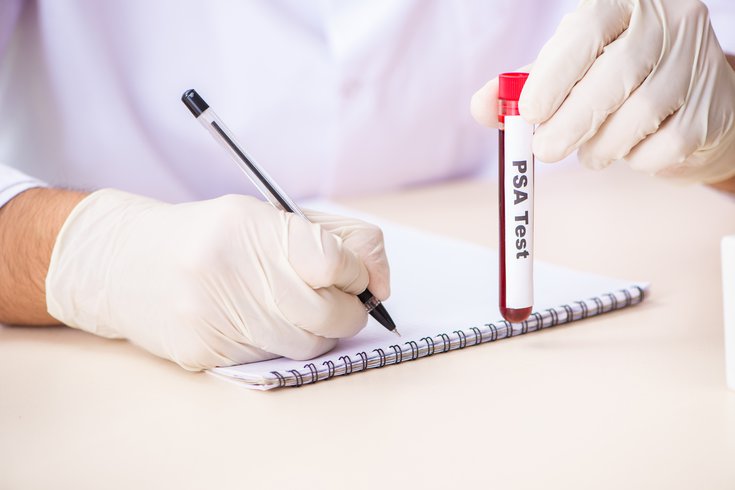
January 14, 2022
 Source/Image licensed from Ingram Image
Source/Image licensed from Ingram Image
Many men remain averse to preventive care, like taking a prostate-specific antigen to screen for prostate cancer. This attitude has led to shorter life expectancies and greater disease among men than women.
Health screenings. They help people avoid future problems and are one of the best ways to improve the effectiveness of a health regimen. Yet, when people avoid them, treatable medical conditions can turn deadly.
Despite these obvious benefits and the risks of delay, many men remain averse to the thought of doing any preventive maintenance on their bodies. This caveman culture, which has led to shorter lives and greater disease than women, is well entrenched when it comes any sort of screenings or routine tests.
Sadly, but all too common, if a man suspects car trouble, he's all over the mechanic to run a diagnostic test to find the source of the problem. When a member of the Eagles is hurt, guys are on the edge of their seats screaming for the medical report. However, in classic male behavior, when it comes to themselves, these concerns go out the window, overtaken by complacency, neglect and even fear. It's a well-documented mindset.
In a survey by the American Academy of Family Physicians, 20% of men age 55 and over reported never undergoing a screening for colon cancer. Similarly, a Cleveland Clinic survey reported that only 50% of men engage in preventative care.
And, in a widely read survey commissioned by Orlando Health, men listed being too busy and fearing the discovery of a problem as the top reason they won't see a doctor and get the testing they need.
So, why are screenings so important? Johns Hopkins Medicine says screenings offer an early warning mechanism and can improve treatment for the cancers that are particularly prevalent in men – prostate, colon and lung.
The University of Pittsburgh Medical Center suggests the value of screenings is in the ability to detect and medical problems before they become more difficult to treat.
For those who think that tests are only necessary when something feels wrong, the National Institutes of Health reminds men that feeling fine is not a reason to forego regular checkups and screenings. High blood pressure, high blood sugar and high cholesterol may not show any symptoms early on. A simple blood pressure check and blood tests can identify many problems and, if you don’t have any, provide important peace of mind.
For guys over 50, there is a fairly common list of screenings. The Health in Aging Foundation provides a schedule that reflects the recommendations of many leading experts. They range from osteoporosis screenings to blood pressure and cholesterol screenings. Also included are a check for diabetes, and prostate and colorectal cancer screenings. Annual tests for hearing and vision are also endorsed, along with dental check-ups.
Integris Health adds to the list by recommending a testicular cancer exam, skin cancer screenings, and a glaucoma test every 1-3 years for men between ages 60-64 and then every 6-12 months after age 65. Back in 2004, the midwestern health system's officials felt so strongly about the poor health habits of men that they created the Men's Health University, which they refer to as Men-U. To improve the chances that men will get the tests they need, Men-U offers screenings and education at sporting events and car shows.
Finally, Harvard Medical School recommends men get a one-time screening for abdominal aortic aneurysm if they have ever smoked.
As men age, good preventive medicine calls for the addition of tests consistent with the increased vulnerability that maturity brings, along with individual circumstances. While the thought of more tests seems like a stretch when many men can't cover the basics, if you consider the opportunities that come with good health, it's a manageable portfolio.
Northwest Primary Care explains how the progression works. In a man's 40s, prostate screenings start along with a diabetes check. At 50, doctors will start checking annually for type 2 diabetes, depression and lipid disorders. Colon cancer screenings also will start and, depending on a man's risk profile, a thorough exam may include oral and lung cancer. When men hit 60, colorectal screening continues, with the potential to add on osteoporosis. Before you turn and run, remember the time and energy you exert on the car and other less life-impacting pursuits.
Consumer Reports provides some additional perspective. Americans, both men and women, are both under-screened and sometimes over-screened. They point out that medical screening is not an exact science. All screenings may still miss problems.
That said, they acknowledge that evidenced-based screenings recommended by leading medical experts can reduce harm and costs. The key, they suggest, is to discuss these guidelines as well as your medical and family history with your physician. Overall, the Centers for Disease Control and Prevention notes that Americans get only half the screenings that they should.
As you start the New Year, how about jumping past the hallow resolutions and do the single best thing you can for your health. Get your butt to the doctor and get the tests you should have gotten years ago. It's the ultimate health benchmark, a simple process that can be the first installment in your health and fitness comeback.
Louis Bezich, senior vice president and chief administrative officer at Cooper University Health Care, is author of "Crack The Code: 10 Proven Secrets that Motivate Healthy Behavior and Inspire Fulfillment in Men Over 50." Read more from Louis on his website.